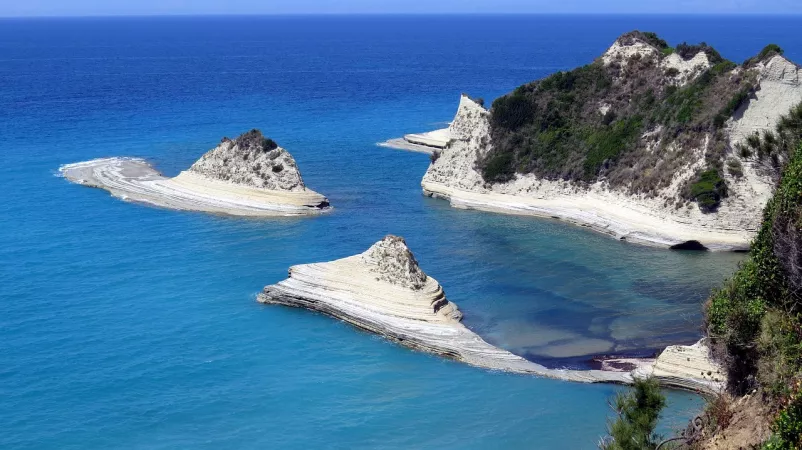
Corfu Travel Guide
Corfu, a Greek island in the Ionian Sea, is known for its rich history, stunning beaches, and vibrant culture. With influences from the Venetians, French, and British, Corfu boasts a unique blend of architectural styles and traditions. Famous for its lush greenery, crystal-clear waters, and warm hospitality, Corfu is a popular destination for travelers seeking a mix of relaxation and exploration.Top Attractions in Corfu
- Old Town of Corfu
- Achilleion Palace
- Paleokastritsa Monastery
- Mount Pantokrator
- Canal d'Amour
Corfu is Famous for
Its stunning beaches and rich history.Top Attractions in Corfu
- Exploring the UNESCO-listed Old Town
- Relaxing on the beautiful beaches
- Visiting historic landmarks like Achilleion Palace
- Enjoying traditional Greek cuisine
- Exploring the picturesque villages
What's Great about Travelling to Corfu?
- Rich history and culture
- Beautiful beaches
- Warm and welcoming locals
What's Not So Great about Travelling to Corfu?
- Peak tourist crowds in summer
- Limited public transportation options
- Higher prices in tourist areas
Travel Tips for Corfu
- Check visa requirements before traveling
- Renting a car is a convenient way to explore the island
- Be cautious of pickpockets in crowded areas
Important Corfu trip information
- Ideal Duration: A week to fully explore the island
- Best Time to Visit: Spring or fall for pleasant weather and fewer crowds
- Nearby Airports and Railway Stations: Corfu International Airport, Corfu Port
FAQ's on Corfu
Q1: What is the best time to visit Corfu?
The best time to visit Corfu is from May to October when the weather is warm and sunny, perfect for exploring the beaches and historic sites. July and August are the peak tourist months with higher temperatures and crowded beaches. Spring and fall offer milder weather, ideal for outdoor activities and sightseeing. Consider visiting during the Easter period to experience traditional celebrations and festivals.
Q2: Do I need a visa to travel to Corfu?
Most travelers from the EU, the USA, Canada, Australia, and many other countries do not need a visa for short stays in Corfu. However, it's essential to check the specific visa requirements based on your nationality before traveling. Make sure your passport is valid for at least six months beyond your intended stay.
Q3: What are the must-visit attractions in Corfu?
Corfu offers a rich history and stunning natural beauty. Don't miss exploring the Old Town of Corfu with its Venetian architecture, visiting the iconic Achilleion Palace, relaxing on the beautiful beaches like Paleokastritsa, and taking a boat trip to the nearby Paxos and Antipaxos islands. Nature lovers can explore the lush landscapes of Mount Pantokrator and the charming villages of the island.
Q4: Is Corfu a safe place to travel?
Corfu is generally a safe destination for tourists. However, like any other place, it's essential to be cautious of pickpocketing in crowded areas and to avoid isolated areas at night. Stay aware of your surroundings and belongings, and follow basic safety precautions. The locals are friendly and welcoming, making Corfu a popular choice for travelers seeking a relaxed and safe vacation.
Q5: What is the local currency in Corfu and can I use credit cards?
The local currency in Corfu is the Euro (EUR). Credit cards are widely accepted in hotels, restaurants, and larger establishments, but it's advisable to carry some cash for smaller purchases and transactions. ATMs are available in most towns for convenient access to cash. Notify your bank before traveling to ensure your cards will work in Greece.
Q6: What is the local cuisine like in Corfu?
Corfu boasts a delicious Mediterranean cuisine with influences from Italy and Greece. Try local specialties like Pastitsada (spiced beef stew), Sofrito (veal cooked in white wine sauce), and Bourdeto (spicy fish stew). Seafood lovers will enjoy fresh fish dishes, while vegetarians can savor the famous Corfiot Bourdeto (spicy paprika peppers). Don't miss out on the local olive oil, feta cheese, and kumquat liqueur.
Q7: What transportation options are available in Corfu?
Corfu offers various transportation options for getting around the island. Public buses connect major towns and tourist areas, providing a cost-effective way to travel. Taxis are available but can be more expensive, especially for longer journeys. Renting a car or scooter is a popular choice for exploring the island at your own pace. Ferries and boat tours are also available for visiting nearby islands and beaches.
Q8: Are there any cultural norms or etiquette I should be aware of when visiting Corfu?
When visiting Corfu, it's essential to respect the local customs and traditions. Dress modestly when visiting churches and religious sites, covering your shoulders and knees. Greeks are known for their hospitality, so it's polite to greet others with a friendly "Kalimera" (good morning) or "Kalispera" (good evening). Tipping is appreciated in restaurants and cafes, usually rounding up the bill. Avoid discussing politics or sensitive topics unless initiated by locals, and be mindful of noise levels in residential areas during siesta time.
Q9: I am a travel agent. How can I buy travel leads of Corfu?
Register yourself as a travel agent at agents.tripclap.com and then you can buy travel leads to Corfu once your account is approved. For more details contact our support team at +91-8069186564 or support@tripclap.com


